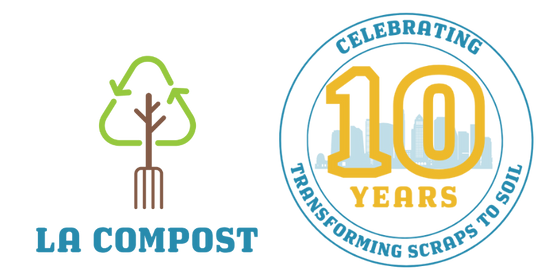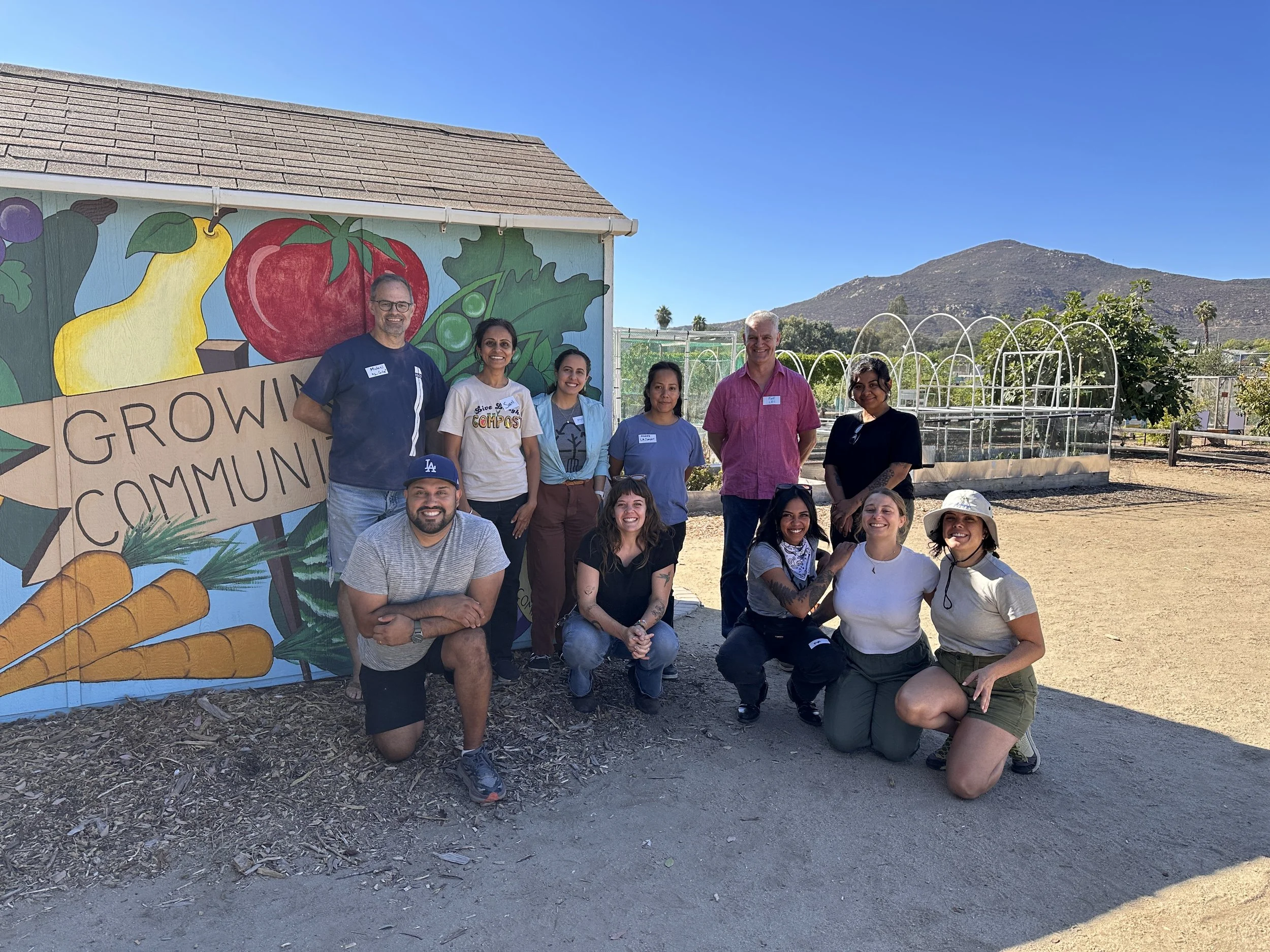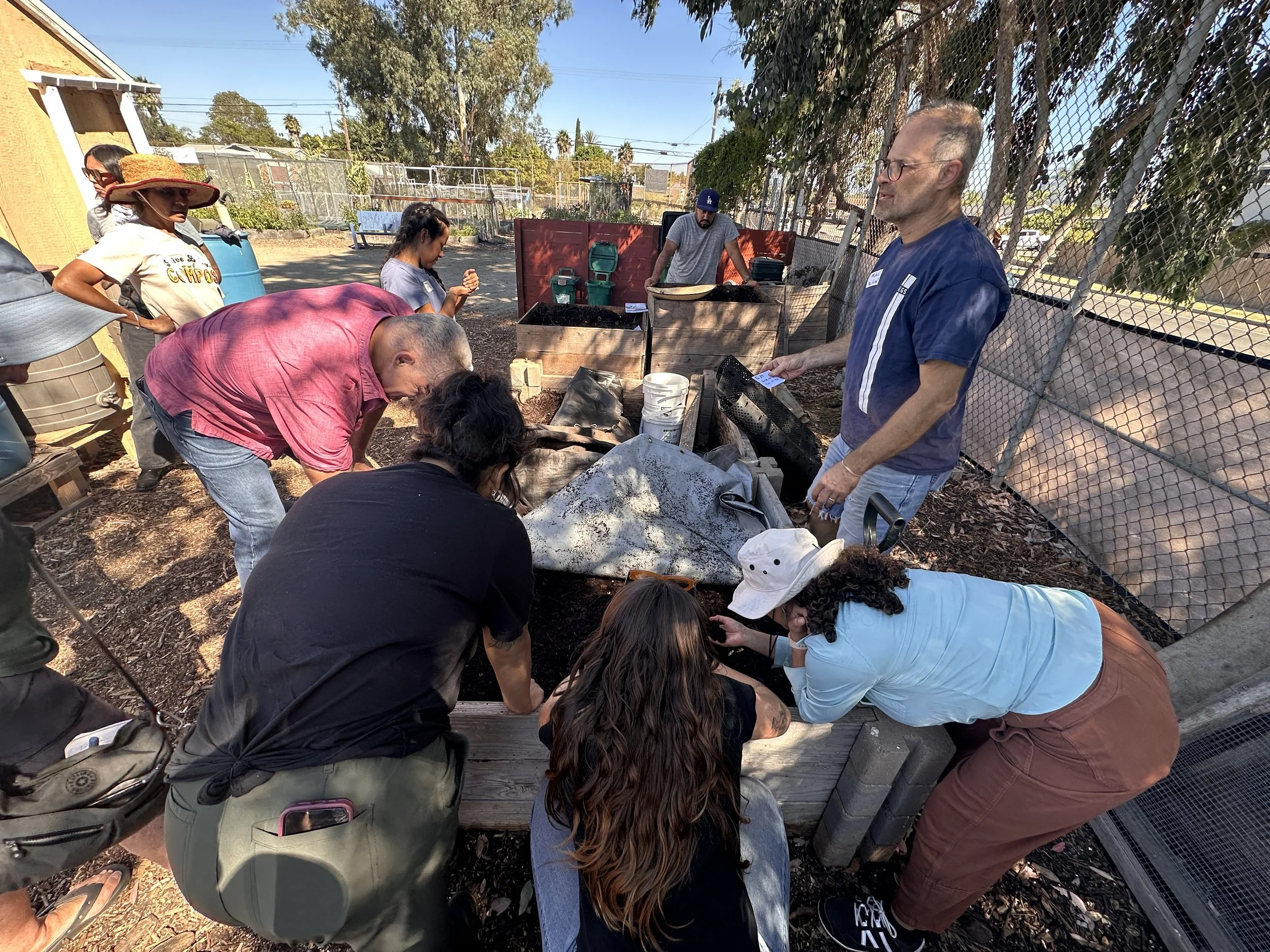Field Trip to Food2Soil in San Diego
LA Compost team members and Food2Soil.
Have you ever felt more inspired when you venture outside your neighborhood or city? Sometimes, visiting a new place can ignite fresh ideas. Our team experienced this firsthand during a recent visit to our friends at Food2Soil in San Diego. We met their passionate community members, explored their composting sites, and had a thoughtful conversation with their founder, Sarah Boltwala-Mesina.
Food2Soil is a for-profit business Sarah launched in 2015, inspired by the need to show the monetary value of reducing food waste. They believe “waste is a resource with intrinsic social, environmental, and economic value.” Their programs aim to harness this value by turning food scraps into income for farmers and living soil for farms. Their mission focuses on building a resource-wise and climate-resilient future.
Backyard trommel for sifting vermicompost.
Vermicomposting Stop
Our first stop was at a Soil Farmer site in the Clairemont area. Soil Farmers are Food2Soil members who collect food scraps at their homes and compost them on-site. Sarah Dumm, a Soil Farmer since 2022, uses vermicomposting to compost food scraps she receives from both Food2Soil drop-off members and a corporate cafeteria contract.
Transitioning from her career in biotech, Sarah dove into sustainable farming and soil science, leading to her vermicompost project. Her system involves first hot composting the scraps and then feeding the pre-processed material to worms, which further breaks it down. She uses a large trommel in her backyard to sift the finished worm-produced compost! Sarah sustains her business by selling both worms and compost, and she recently left her job to pursue vermicomposting full-time. A highlight of this visit for our team was learning that worms reproduce by producing tiny cocoons!
Sally Tinker in her garden.
Food2Soil food scrap drop off bin outside Sally's home.
The Garden That Compost Built
Next, we visited Sally Tinker in Mission Hills, who has been a Soil Farmer since 2019. After a friend showed her a Food2Soil Instagram post, Sally realized she was already composting and could do more to connect with others wanting to reduce their waste. Sally maintains an immaculately maintained compost drop-off bin and receives member food scraps and coffee grounds from a local café.
Sally’s proudest accomplishment is what she calls “the garden that compost built.” She explained how her soil, once mostly clay and sand, transformed into rich, healthy soil thanks to her compost system, allowing her garden to flourish. Additionally, her extra income through Food2Soil has given her more time to spend in her thriving garden.
LA Compost team at the San Carlos Community Garden.
San Carlos Community Garden
Our final stop was the San Carlos Community Garden, a community-scale site where Food2Soil processes food scraps from member drop-offs and corporate contracts. Michael, a two-year volunteer, helps with compost processing at this location. He shared his enthusiasm for learning about composting and eagerly asked our team questions about the compost system onsite.
While at the garden, we spoke with founder Sarah Boltwala-Mesina about the impact of the SB 1383 Organics Mandate. The City of San Diego now offers bundled curbside organics collection, which has made it difficult for residents to opt out in favor of community composting. As a result, Food2Soil's membership has dropped significantly.
Despite the challenges, Sarah has identified gaps that Food2Soil continues to address. Multi-family units often lack space for a green bin, and households that produce minimal waste find it impractical to fill a full city bin. Food2Soil is committed to serving these needs in addition to corporate contracts that value the benefits of community composting.
A Shared Mission for Community Composting
To conclude our visit, both Food2Soil and LA Compost discussed the ongoing challenges of educating residents about community composting. As our cities work to teach residents how to properly use their organics green bins, reduce contamination, and ensure food scraps are composted, some residents still face difficulties.
Sarah left us with an inspiring reminder: “The best way to ensure your food scraps are composted is to take them to a community composter.”
Reflecting on our team’s visit to San Diego, Paola Reyes, LA Compost’s Community Engagement Manager shared, “It’s so important to connect with local composters in our region and share knowledge and ideas. We are in a time of palpable transition in our state regarding food waste management.” Paola speaks about the composting options currently available in the greater LA area; many residents now have access to a green bin, while others can use community composting options or compost at home.
With Sarah from Food2Soil’s words in mind, Paola continues, ”There is so much opportunity to expand efforts on education and to communicating to the general public that community composting plays an important role in assuring California residents that their food scraps will be processed with care, and that finished compost will have an impact on other innovative and educational projects across our state. Additionally, community composting can offer many perspectives: science, beautification, entrepreneurial possibilities, and community building.”
If you’re in the San Diego area and would like to get involved with Food2Soil’s community, visit their website Food2Soil.net or follow them on Instagram





